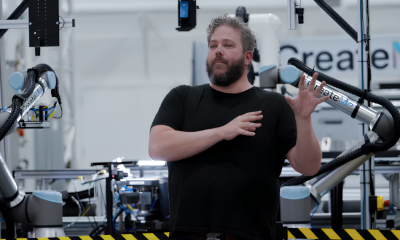Interviews
John Gaeta, Founder and CEO of Escape.ai – Interview Series

John Gaeta, Founder and CEO of Escape.ai, is a visionary innovator best known for his Academy Award-winning work on The Matrix trilogy. A pioneer in immersive media and future-facing technologies, Gaeta has spent his career exploring the fusion of storytelling, real-time rendering, spatial computing, and artificial intelligence to push the boundaries of how audiences experience narrative worlds.
With escape.ai, Gaeta is now focused on showcasing the next generation of AI-generated and AI-enhanced film content. The platform serves as a curated space for cutting-edge audiovisual experiences powered by generative AI, highlighting the future of storytelling through experimental formats and intelligent media. By spotlighting this emerging wave of creative work, Escape.ai is redefining what streaming looks like in the era of artificial intelligence.
What inspired the founding of Escape.ai, and how does it tie into your long-standing mission to reinvent cinematic storytelling through technology?
escape.ai was born from a very personal mission: to empower creators to tell epic stories — without asking for permission. For decades, Hollywood has been the gatekeeper of cinematic scale. But with AI, real-time engines, and immersive formats, we now have the tools to let any creator rival the scope of a studio. escape.ai is about building that bridge — a platform where visionary storytellers can wield next-gen tools to shape worlds, own their IP, and go head-to-head with the giants. It’s about democratizing entertainment.
You’ve described Escape as a “Neo Cinema” platform. Can you define what Neo Cinema means to you and how it differs from traditional or even modern digital cinema?
Neo Cinema is a spirit and movement that is pushing the next paradigm of storytelling and story-world making. It’s built upon the foundations of cinema while also disrupting and evolving it.
Elements of Neo Cinema:
- Disruptive Content Making Methods & Technologies (Gen Ai, Game Engines, New tech)
- Traditional and Inventive Forms and Formats for Storytelling & World Building
- Modern, Agile and Tech Empowered Creator Class
From The Matrix to Magic Leap to ILMxLAB to Epic Games to Inworld ai, you’ve always worked at the intersection of story and tech. How has that journey informed the DNA of Escape.ai?
My journey’s always been about expanding the ways stories and worlds can be experienced and breaking narrative constraints. With The Matrix, we glimpsed virtual myth-making. At Magic Leap and ILMxLAB, we experimented with blurring reality with beloved worlds like Star Wars. At Epic, we showcased the next plateau of cinematic-interactive platforms. And at Inworld we catalyzed the first steps toward intelligent Characters. Escape.ai is where it all comes together — and where creators, not corporations, hold the keys. This DNA is critical: we’re not just innovating formats; we’re redistributing power. With AI and real-time tools, creators can now compete with legacy studios — on their own terms. Escape.ai exists to make that vision real.
What are the most exciting or transformative ways you’re seeing Generative AI and game engines used in storytelling today?
What excites me most is that the creative asymmetry is disappearing. With generative AI and game engines, a small team — or even a solo creator — can now prototype entire worlds, animate characters, generate visual effects, and scale ideas in days, not months. These aren’t shortcuts — they’re force multipliers. We’re seeing creators take risks, tell personal epics, and go direct-to-audience. AI doesn’t just amplify the natural talents of human storytellers; it levels the playing field by allowing new voices to be heard. It gives indie storytellers the means to launch franchises — and on escape, they actually own them.
Do you believe AI filmmaking will eventually merge with traditional Hollywood, or are we witnessing the birth of an entirely new industry?
We’re witnessing both. Hollywood will absorb some of these tools — it already is. But at the same time, we’re seeing a new wave of storytellers who aren’t waiting for access. They’re building their own ecosystems — decentralized, creator-owned, and super tech empowered. It’s not just a technological shift; it’s an economic one. When creators use next generation tools to make blockbuster-quality content and distribute it through platforms like escape.ai— while retaining their IP — we’re not just evolving an industry. We’re creating a parallel one.
How do you respond to skepticism around the creative legitimacy of AI-assisted content? Can these stories still be “human”?
The human heart and mind is still the source. Human authors are ground zero if something capable of authentic human resonance is the objective. AI tools are just extending the reach of human imagination, in the same way that special effects enabled the making of The Wizard of Oz or 2001: A Space Odyssey. Early computer graphics made films like TRON possible and once it arrived, were people worried that human creativity would go extinct because we were turning to computers to become our next paint brush? No. The stories are still ours — our fears, our hopes, our myths — only now we can express them more vividly, more flexibly, and more independently. AI doesn’t replace creativity; but can help to remove the obstacles between vision and realization. And because creators can now build and publish without a massive budget or corporate backing, we’re actually seeing more human stories — from more voices — than ever before. Authenticity thrives in freedom.
In your view, what role will human authors and actors play in the future of AI-powered cinema?
They’ll be at the center — but in new ways. Writers won’t just script linear plots; they’ll design narrative ecosystems. Actors will blend physical and digital performances, creating personas that persist across mediums. What changes is the canvas — not the soul. AI allows human creators to do more, faster, and with fewer constraints. It also gives them control over the avatars, characters, and universes they create — and the ability to monetize those assets directly. We’re entering an era of creative sovereignty.
You’ve said Escape.ai isn’t just about technology but about discovering “masters of a new craft.” What are the new skills today’s filmmakers need to thrive in this hybrid creative world?
Today’s new masters sometimes think like systems designers. With unprecedented access to rapid iteration they are able to fail fast and learn from mistakes leading to better understanding of story and structure — world-building, and audience receptivity. This year and beyond we will see a great convergence between this pioneer sector and the pre existing sector of natural creative risk takers, brilliant writers, producers and performers that are often frustrated by the “hollywood” media complex they have contributed so much to yet are constrained by. Most importantly, the modern creator is beginning to understand the value of ownership as they become ever more wary of old paradigm exploitation. At least I hope they are. It’s not enough to make something beautiful — you have to own your world, protect your IP, and build sustainable paths for your work. Escape.ai exists to support that entire creative cycle — from spark to storyworld to platform.
You’ve described Escape.ai as a “Netflix for Neo Cinema.” What does that experience look like for viewers — and how does it differ from a traditional streaming platform?
Escape.ai appears on its face as a beautifully presented streaming service but it’s not just where you watch — it’s a destination you can enter. Beyond the new world of cutting edge original content there are social places where the creators hang out, meet each other and meet fans. Places such as our social feed or our majestic retro future immersive theater. Any visitor to escape can choose to watch videos traditionally or they can literally hit an escape button and find themselves inside a social interactive theater where they can watch and celebrate with friends. It’s a place where stories can evolve, where creators can speak directly to audiences, and where fans can support and influence what gets made next. And because the creators own their work, they can also grow it across games (Neo Play is being developed now), series, merch— without losing control. That’s the power of Neo Cinema.
You’ve introduced features like virtual theaters and creator journals — can you talk about how Escape is blurring the lines between streaming, social, and creator economies?
Escape.ai is designed to bring creators and audiences into the same space — not just as viewers, but as a community. Virtual theaters allow real-time premieres with global participation. Creator journals offer transparency and insight into the creative process. It’s not just entertainment — it’s an ecosystem. And we’re tying this to economic models that reward creators for engagement, not just views. IP ownership becomes the foundation for a true creator economy — where success is shared, and fans feel connected to the worlds they help elevate.
Escape.ai empowers creators to retain ownership of their IP — a rarity in today’s entertainment world. How important is that to your philosophy?
It’s the core of our philosophy. Without ownership, creators are labor. With ownership, they’re architects of culture. At Escape.ai, we’re building a world where artists don’t have to sell their rights to tell their stories. They build once, own forever, and grow their IP across formats. Emergent tech like GenAI makes it easier to produce content — but publishing that content allows fan bases to emerge and that makes ip more valuable, because it can scale across games, simulations, sequels, even merchandise. We want creators to not only make iconic worlds — but to own the mythology. All that said, the people behind escape are in fact creators as well. We have every intention in collaborating with many of the creators on escape in pursuit of our own originals.
For a young filmmaker or game artist reading this — what’s your advice on getting started in Neo Cinema?
Start building your universe — even if it’s small. Use the tools — game engines, AI generators, world editors — and learn by doing. Don’t wait for permission. Don’t wait for a greenlight. You can create cinematic content today. If your ideas are compelling you might even challenge anything on streaming platforms. What matters most is your voice. This is the time for bold creators to step forward. The gates are open. Please know that escape is for creators across the spectrum, from the newly minted to the highly established. If you want to sidestep the system, and tell the story you want not the one you’ve been told you must, turn to Neo Cinema.
Thank you for the great interview, I urge readers to visit escape.ai and watch a few shorts to experience the future of video streaming and digital story telling.












